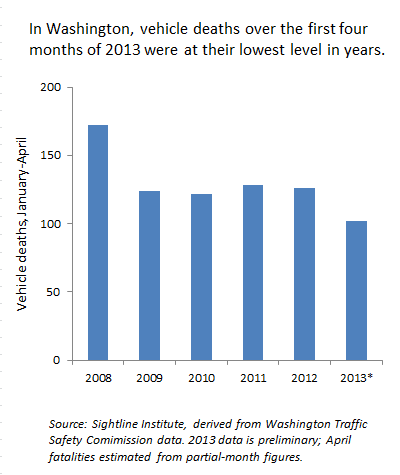One of the often-overlooked benefits of declining driving, particularly among the young, has been a rapid reduction in car crash deaths over the past decade. And those safety improvements have probably been helped by falling sales of super-sized pickups and SUVs, along with other promising automotive technology trends.
But during last year’s debate over marijuana legalization in Washington, I heard quite a bit of concern that permissive marijuana laws would reverse the recent declines in crash fatalities. I recall chatting with a well-meaning tow truck driver—a guy who’d seen the aftermath of a lot of terrible crashes—and he was convinced that legalizing pot would just mean more dead kids. Being a parent myself, I found it easy to understand that perspective. Despite a long-term decline in alcohol-related crashes in the state, drunk driving is still a very serious problem—and I can certainly relate to the fear that legalizing another intoxicating substance would boost car crash deaths.
So far, though, the opposite has been true: crash fatalities in the first part of the year seem to have fallen to a new low. See the chart to the right for details—we only have data through April 23, but extrapolating the early year data through the end of the month, we’ve still seen far fewer crashes during the first part of the year than we’ve seen in a while. The long-term trend towards fewer crashes seems to be continuing.
Of course, the numbers are still preliminary, so we shouldn’t read too much into them. And with such a small sample size it’s a bit early to draw firm conclusions. Still, it’s hard to find evidence in the early accident reports that there’s been any uptick in crash fatalities. In fact, based on the long-term vehicle death trends for the state, it looks likely that this has been the safest start to a year since at least 1980; and if the long-term state fatality trends mirror the nation’s, it may be one of the safest starts to the year since the 1950s.
We may have to wait a while to be absolutely sure of the numbers. But if the early trends continue, other states and jurisdictions would be wise to take notice. Marijuana laws are expensive to enforce, and help perpetuate substantial racial and economic disparities. (I’d recommend this documentary for a stark view of the effects of the nation’s drug wars.) So if there’s no compelling public safety reason to continue enforcing marijuana laws, perhaps we’d all be safer, fairer, and richer without them.


Comments are closed.